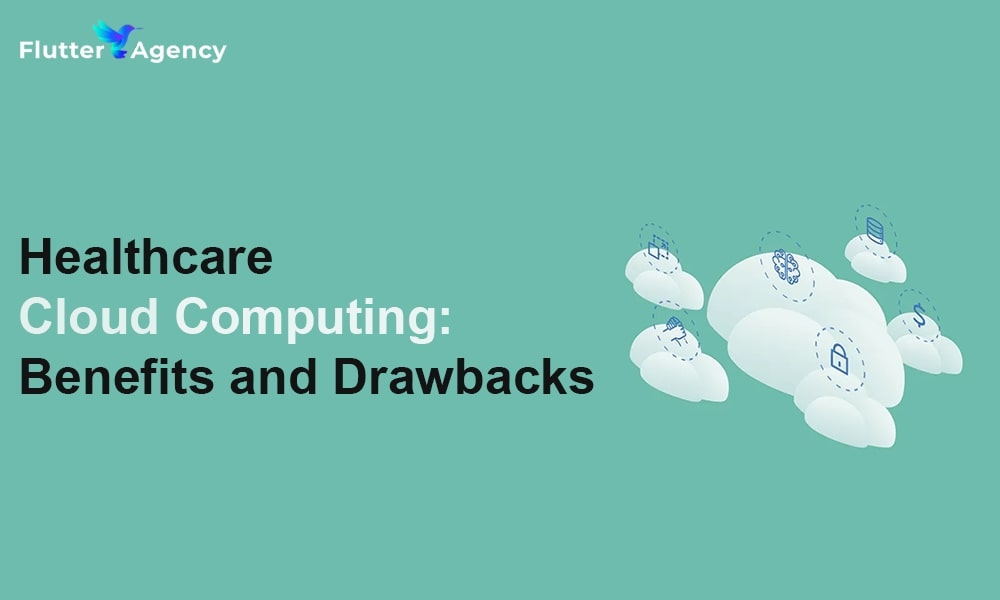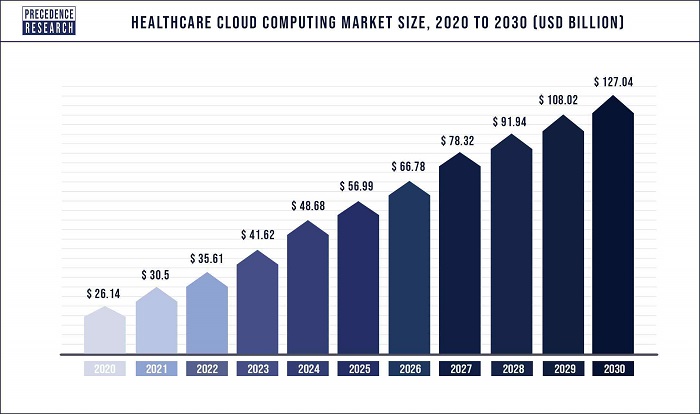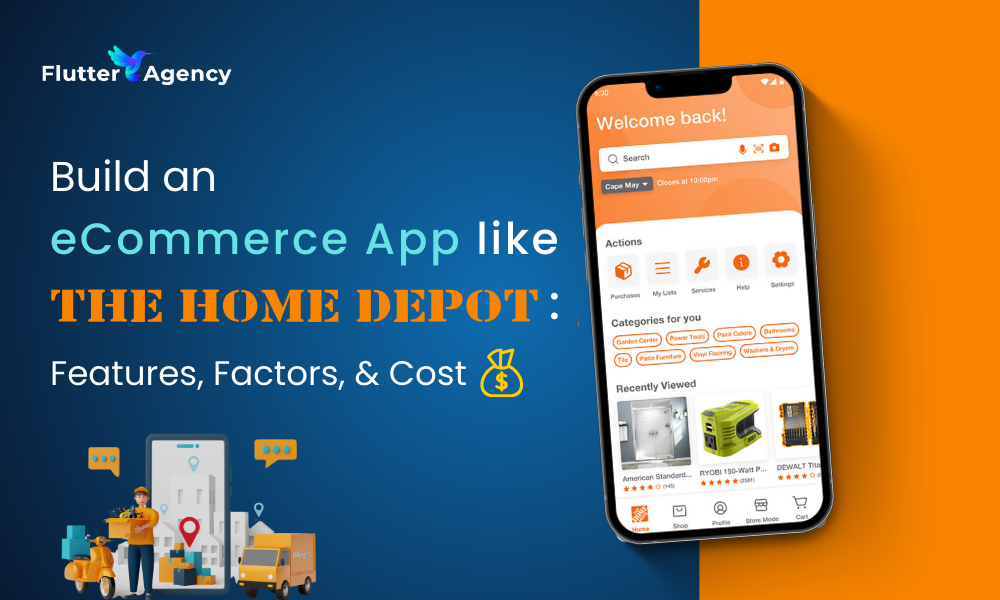Healthcare Cloud Computing: Pros and Cons
With its broad acknowledgement across numerous industries, including Healthcare, cloud computing has recently become a part of everyday life buzzword. The healthcare sector has proven an excellent opportunity to adopt cloud computing due to the enormous data collection.
Cloud computing is used in the healthcare industry to store and manage massive amounts of data, including electronic medical records (EMRs), patient data, and medical imaging.
The importance of cloud computing in Healthcare, its benefits and drawbacks, and some best practices for medical professionals using cloud computing will all be covered in this blog post.
Let’s begin with the significance.
Cloud computing’s impact on Healthcare
The healthcare sector has been dramatically influenced by the revolutionary innovation known as cloud computing. There are several advantages to it, some of which include:
- Collaboration and communication improvements
- Money saved
- Improved flexibility & accessibility
- Improved disaster recovery and data security
- Scalability and Effectiveness
However, more than just grasping the key components is required; it is essential to delve into the current details of how these advantages materialize.
The market for cloud computing in Healthcare
The market for cloud computing in healthcare is expected to grow from its current estimated value of USD 35.61 billion in 2022 to USD 127.04 billion by 2030,from 2022 to 2030, at a CAGR of 16.4%. of roughly 17.2%.
Using cloud technology in healthcare software development has both benefits and drawbacks. Some of the major benefits are as follows:
Healthcare cloud computing benefits
The healthcare industry’s unique value proposition is the leading cause of digitization in that sector. We will examine the benefits of cloud computing in Healthcare to investigate this further.
1. Improved availability and adaptability
Thirdly, cloud computing gives healthcare providers more accessibility and flexibility. With cloud-based applications, medical experts can access vital information anytime from any location with an internet connection.
This feature encourages flexibility for healthcare practitioners to deliver care remotely and interact with other healthcare providers as and when needed while enhancing the accessibility of healthcare services.
2. Collaboration and communication improvements
First and foremost, one of the most important advantages of implementing cloud computing in Healthcare is that it improves interaction and collaboration. With the help of this latest technology in healthcare sector, medical staff may collaborate and communicate more successfully since they have access to patient information and other crucial data at any time, any place.
This feature improves communication between doctors and patients and encourages healthcare professionals to make well-informed decisions.
3. Efficiency and scalability
The incredible scalability and efficiency of cloud computing in the healthcare industry is a mind-boggling and unexpected benefit. They can quickly and easily scale their IT infrastructure up or down anytime because of cloud computing.
A more effective response to the healthcare sector’s continuously changing demands results in high flexibility.
Cloud computing is a game-changer in the healthcare sector because, compared to their traditional on-premise counterparts, cloud-based solutions offer a level of efficiency that can result in considerable time and money savings for healthcare experts.
4. Money saved
The use of cloud computing can significantly reduce costs for healthcare providers. For example, cloud-based technologies do not require costly hardware or software. This perk helps healthcare practitioners cut costs by preventing them from purchasing massively expensive technology and software.
The pay-as-you-go cloud computing approach also guarantees that healthcare providers only pay for the resources they utilize.
5. Improved disaster recovery and data security
Cloud computing provides healthcare providers with enhanced protection of data and disaster recovery. Every industry, including the healthcare sector, needs help with data security.
With cloud-based tools, healthcare providers can store patient data in redundant, secure data centres.
Additionally, this technology guarantees quick and simple data restoration during a disaster or system fault.
Healthcare cloud computing drawbacks
While using cloud computing in the healthcare industry has many benefits, there are also some possible downsides to take into consideration. The following are some drawbacks of cloud computing in the healthcare industry:
1. Technology dependency
Utilizing cloud computing in Healthcare necessitates an emphasis on technology on behalf of healthcare professionals. Therefore, any downtime or service interruptions could have an adverse effect on patient care.
Furthermore, healthcare experts must have the technological know-how to operate and maintain their cloud-based technology.
2. Challenges with regulatory compliance
Many data privacy and security laws, including HIPAA and GDPR, must be observed by healthcare professionals. Because healthcare providers must ensure that cloud service providers comply with every relevant rule, using cloud computing in the industry might present additional regulatory compliance challenges.
3. Potential service interruptions and downtime
Service interruptions and downtime are not unusual in cloud computing. Healthcare providers must ensure they have a plan to reduce how downtime impacts patient care.
Additionally, healthcare practitioners must ensure they have the required technological assistance to solve any problems as soon as they occur.
4. Security and privacy concerns
Data security and privacy are two main issues with cloud computing in the healthcare industry. Healthcare providers must ensure that patient data is protected from theft, hacking, and unauthorized access.
The healthcare sector must also ensure cloud service providers comply with all applicable data privacy and security laws.
5. Limited ability to manipulate data
Hospitals must rely on cloud service providers to manage and keep patient data in the age of cloud computing. This implies that healthcare professionals limit the amount of data management.
Medical providers should also make sure they have a plan in place for retrieving their data in case they decide to migrate to another cloud service provider.
Healthcare best practices for utilizing cloud computing
The healthcare sector should adhere to the following best rules to maximize the advantages of cloud computing while minimizing the risks:
1. Choosing a reliable cloud service provider
Healthcare providers should consider things like a cloud service provider’s healthcare experience, data privacy and security policies, compliance with applicable laws and standards, scalability, and reliability when making decisions. Due diligence should be done on the provider’s performance and track record.
2. Ensuring the security and privacy of data
Medical professionals must ensure their data is safe and secure when using cloud computing. This involves employing measures like encrypting data, limiting access to sensitive information, and monitoring breaches or unauthorized access.
3. Performing routine risk evaluations
Healthcare providers should conduct regular risk assessments to identify potential security risks and vulnerabilities. This includes detecting and evaluating service availability and performance risks, as well as threats to data privacy and security.
4. Creating a disaster recovery strategy
In the case of a disaster or service disruption, healthcare providers should have a disaster recovery strategy to ensure they can restore crucial data and systems. Regular backups and recovery plan testing are part of it.
5. According to the relevant regulations and standards
Healthcare professionals must follow and abide by several rules and policies regarding patient data security, privacy, and compliance. This incorporates rules like HIPAA and GDPR as well as standards like ISO 27001 and NIST.
Conclusion
The potential for cloud computing to completely transform the healthcare sector is enormous since it provides benefits like improved collaboration, increased flexibility, accessibility, enhanced data protection, and disaster recovery.
However, healthcare providers must be aware of the challenges and pitfalls that cloud computing may present. These risks include concerns about privacy and security, a strong reliance on technology, and constant regulatory compliance challenges.
Healthcare experts must research and apply the lessons discovered from prior successful and unsuccessful implementations to maximize the advantages of cloud computing while minimizing risks.
The health tech sector’s development and patient care enhancement depend heavily on cloud computing technology. As the healthcare sector evolves, cloud computing will stimulate innovation and improve patient outcomes. We can assist if you’re looking for a top healthcare development company like flutteragency.com.
Frequently Asked Questions (FAQs)
1. What benefits does cloud computing offer healthcare facilities?
Patients and doctors can often benefit from cloud computing in the healthcare industry. A few advantages of using cloud technologies in healthcare are decreased costs, improved privacy, and the facilitation of better patient care through collaboration and interoperability.
2. Why do we need cloud computing in Healthcare?
Although cloud computing has been available for a while, the healthcare sector has only begun to utilize it. In a secure environment, cloud computing stores patient data and other sensitive information. This prevents the data from being kept on specific computers or devices, which could otherwise be lost or stolen.
3. What role will cloud computing play in Healthcare in the future?
Cloud computing can assist users in managing enormous volumes of data and promote the integration of artificial intelligence into standard healthcare operations. The ability of associated medical devices to communicate with the systems used to hold patient data has grown in importance.
Contemporary ventures
Recent blog
ready to get started?
Fill out the form below and we will be in touch soon!
"*" indicates required fields














